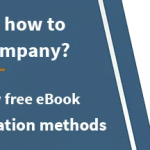Selling your business is no easy task. Here are 8 negotiation techniques you should know in order to maximize its sale value.
First steps when selling a business
1. Prepare the company for the sale.
If you were to sell your house, you would take the time to fix it and make it look as appealing as possible to buyers. The same applies to your company. For example, there are some financial figures that you should improve to make your company look more attractive to investors.
2. Know what it is worth.
You should understand your company’s valuation. You should not share this information with the buyer, but you should understand what the drivers of the value are in order to be prepared for the negotiation.
3. Have alternatives.
Having back-ups is key, and in order to find alternatives, you must look for them. It is not a good idea to sell your company to the first buyer that comes across. You have to create alternatives by looking for those that have the best financial capacity in the business world.
4. Create the right setting.
You need to make sure you create the right setting. The appropriate people must be at the negotiation table. You have to understand the key people and what their interests are because different players may have conflicting interests.
Learn, be ambitious and don’t be the sole decision maker: don’t forget this negotiation techniques
5. Learn as much as you can.
You should try to build a personal relationship with the buyer and measure the situational power. Knowledge is power, so you have to understand what the other person knows about you.
6. Be ambitious.
You should try to be ambitious and throw down the anchor. However, you should be sensible. It should be done in a reasonable way using reasonable arguments. Sometimes, it is not a matter of what you ask but rather how you ask it.
When you negotiate the sale of your business, a useful M&A negotiation strategy is to anchor the negotiation from the top with an aggressive demand. Learn more about it reading “Key for M&A negotiation strategy: Throw down your anchor“.
7. Start the negotiation with the most problematic point.
The tendency is to start the negotiation with the easiest topics and leave the problematic topics for last. However, this is a big mistake. The toughest things should be discussed and sorted out at the beginning of the discussions when both parties are excited about the deal so the issues can be easily ironed out. Whereas, when these items are left for last, when each little wrinkle could be really problematic, the chances of finding common ground become slim to none.
8. Have a team of advisors.
You should always have a team that you can rely on. You should never be the sole decision maker for your party. In negotiations, this will help you give the impression that you are not the whistleblower and that you need to consult issues with your advisors.

















